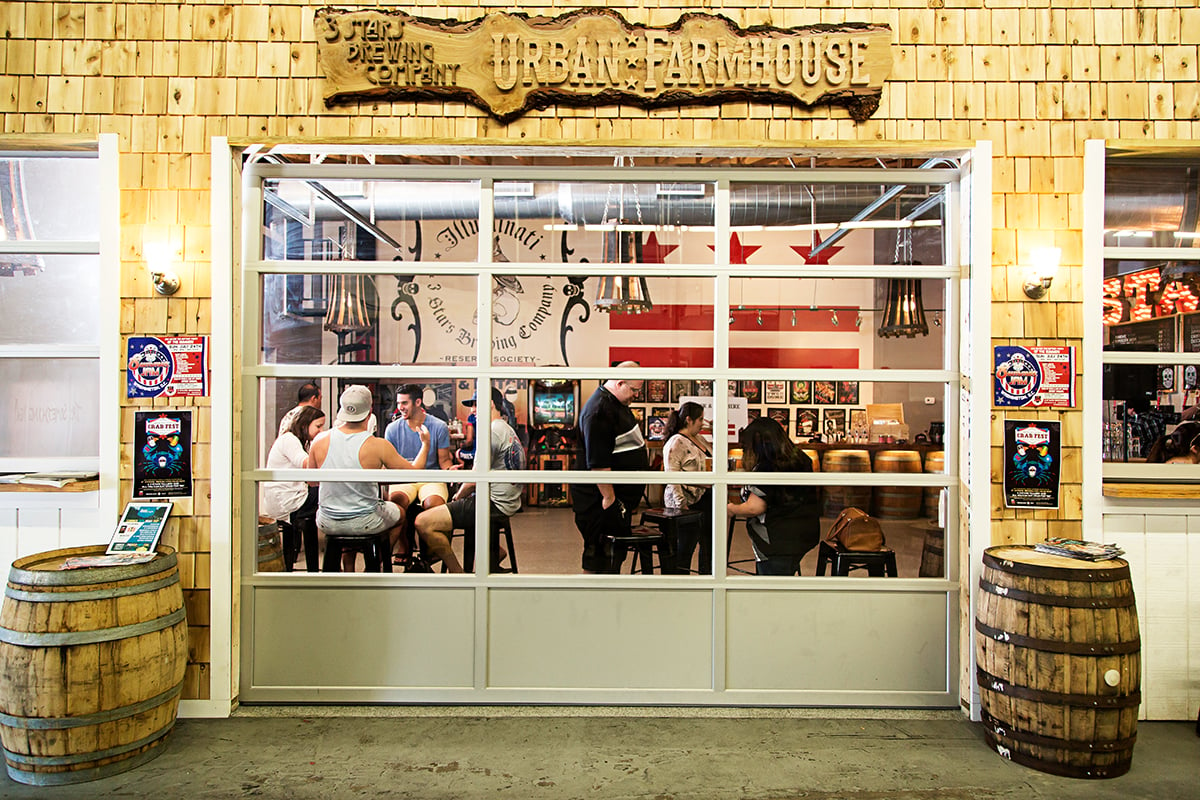Amy Freed stars in Arena Stage’s You, Nero. Photograph courtesy Arena Stage
During her 18-year career, Amy Freed, a playwright-in-residence at Arena Stage, has written about Sylvia Plath (The Psychic Lives of Savages), TV reporter Jessica Savitch (Still Warm), and family reunions (Freedomland, a Pulitzer Prize finalist). In You, Nero, running through January 1 at Arena, Freed sets her sights on an infamous Roman emperor. We caught up with her to discuss culture, inspiration, and what it means to be a playwright in the era of reality television.
Tell us about You, Nero.
The play is a fantasia on the theme of Nero and his illicit relationship with his mother. It’s a fairly broad and ferocious comedy. I originally wrote it for an actor named Danny Scheie, who is a supreme comic muse for me. He plays Nero, and Nancy Robinette plays Nero’s mother—she’s another actor I think is wonderful. The play deals with Nero’s relationship with the arts, and the part that’s historically true is derived from the time in Roman history when entertainment shifted from tragedy onstage and serious drama to spectacle and arena entertainment. That’s the serious level of the play that I don’t know if anyone will care about or get, but that’s the deeper thought behind it. It’s a critique of what American culture has become and what the public is demanding.
What are the specific parallels between the play and what you see as the current state of our culture?
I read somewhere in my research that by the time of Nero, serious theater wasn’t being performed in Rome anymore, and in some places it was banned. And because I write for theater, I think continuously about what the function of it is, and what the good of it is. In its origins, theater was a way of calling society to account, of reflecting on itself. I don’t know that one can say that of all the arts, but it’s certainly true of the art we treasure and value from one generation to another—lasting art. It’s always had a reflective quality, and to enter an engagement with it makes you think, feel, reflect, and maybe protest trends that seem destructive or dangerous. Recently, things seem to have shifted more to an equivalent of the Roman spectacle era, which had art as a pacifying force or a drug. The year I wrote the play, the focus on on-demand entertainment that seemed to be catering to unhealthy appetites was really upsetting to me. The pressure for writers is heavy, because it’s like, Oh, an audience won’t sit for that, or an audience doesn’t want to listen to that, doesn’t want to be led there. There’s a real dumbing-down of art where there’s an atmosphere that suggests an audience shouldn’t be asked to bring anything at all. That’s a sad thing for me. The play itself is kind of a vaudeville—it’s closer to Blackadder than anything else, which is one of my great fetishes—so it bears that relationship to serious history, but I do think the parallels are real and should be a caution to us. What happens to a culture when it has no place for poetry or drama or literature?
Did you draw on your own experiences to create the playwright character in You, Nero?
One of our main sources for information on Nero’s life is a historical writer, Suetonius. He evolved into a character, and I changed his name to Scribonius, which is actually a name I found in the history books somewhere. So then the play evolved into a confrontation between essentially the last playwright in Rome, the last guy who’s trying to do serious work, sort of a comic compilation of every playwright who’s ever tried to do anything important or meaningful, up against this guy who’s like a Vegas impresario. But yes, I can safely say I inserted myself into the character of this struggling, bitter old man.
What was your inspiration for the play?
You never know when something’s going to hit you. I think playwrights find their sources every day in different pockets. I tend to come from character first, so what usually hits me is a certain voice. When I worked on my first play about a TV journalist, I was really fascinated by the dilemma of women trying to make their way in the workplace of American public life, and the conflicts of being a woman, being a performer, and having to perform with your femininity within the workplace. That was very personal and came out of my own conflicts at that age—I had been an actress, and was realizing that the shelf life of an actress is like that of a housefly. Most of my plays come out of things I’m really angry about, I guess because playwriting is an attempt to set things right.
You’re a playwright-in-residence at Arena. What has that experience been like?
It’s kind of huge, I have to say. You’re working in the dark on spec as a playwright, and it doesn’t matter what you’ve done, who you are, what track record you have—you’re starting out fresh every time you pitch a play. So to have a connection with an institution that produces new plays—it’s a tremendous shot in the arm. Even on the basic level of knowing they’re going to produce something, there’s this great release and relief. Very few theaters are taking submissions anymore, and a lot don’t have literary departments, so things are much rougher. Arena’s launching of this project is phenomenal in terms of its importance for writers. If you give writers enough security and validation that they feel encouraged, I would think what it would lead to is much more ambitious projects. It’s an invitation to go bigger, and it’s tremendously exciting, and I wish more theaters would get in the game.
You, Nero is at Arena Stage through January 1. Tickets ($40 and up) available at Arena’s Web site.
An abbreviated version of this interview appeared in the November 2011 issue of The Washingtonian.



















